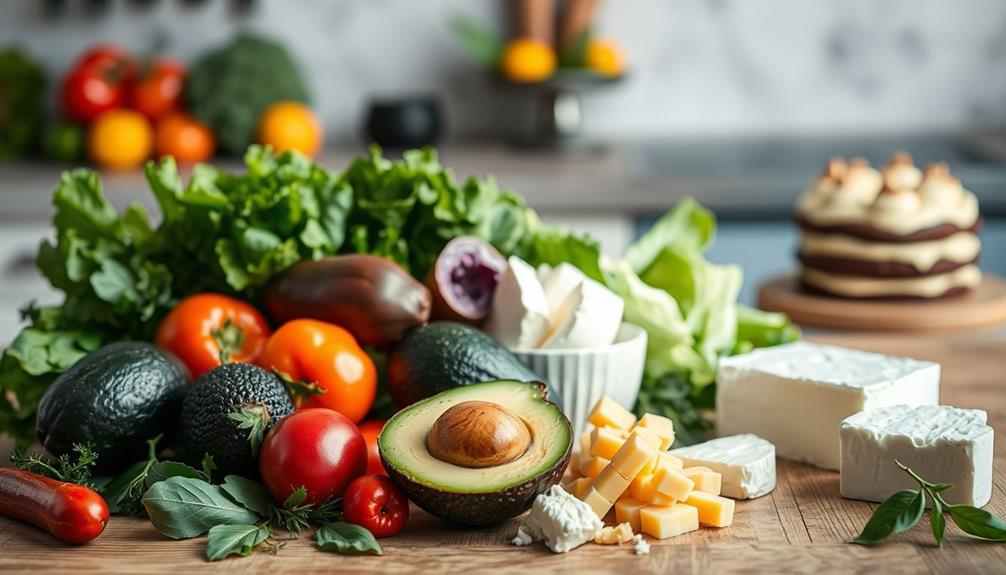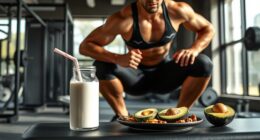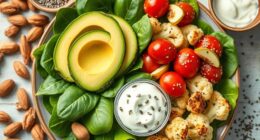The Keto diet can be a double-edged sword for your cholesterol. While it often raises HDL (good) cholesterol and lowers triglycerides, it may also increase LDL (bad) cholesterol, especially if you choose unhealthy fats. How you tailor your fat sources makes all the difference. Eating healthy fats, like olive oil and avocados, can enhance your lipid profile and support heart health. Regularly monitoring your cholesterol levels is essential to navigate these risks. If you want to understand how to balance these elements effectively, there's more valuable information ahead. For a comprehensive understanding of how to manage cholesterol while on the Keto diet, it’s crucial to educate yourself on the best practices. Luckily, there are resources available to help you make informed decisions about your dietary choices. One such resource is the ‘beginner’s guide to keto diet,’ which provides valuable insights into optimizing your fat intake for improved cholesterol levels. By learning and implementing the principles outlined in this guide, you can proactively take control of your health and mitigate the potential risks associated with the Keto diet.
Key Takeaways
- The Keto diet can increase LDL cholesterol levels if unhealthy fats are consumed, posing a risk for heart disease.
- Conversely, the diet often improves HDL cholesterol and lowers triglycerides, enhancing overall lipid profiles.
- Prioritizing healthy fats like avocados and nuts is crucial for maintaining a balanced cholesterol level.
- Regular monitoring of cholesterol levels is essential to manage potential risks associated with the Keto diet.
- Nutritional deficiencies can occur on Keto, necessitating the inclusion of nutrient-dense foods and possible supplementation.
Understanding the Keto Diet

While you might've heard of the keto diet, understanding its core principles is vital for anyone considering this approach to nutrition.
The keto diet focuses on drastically reducing your carbohydrate intake while increasing your fat consumption. This shift encourages your body to enter ketosis, a metabolic state where fat becomes the primary energy source instead of glucose.
By generating ketones from fats, you can potentially enhance fat burning and support weight loss. It's important to prioritize the quality of fats you consume, opting for healthy sources like avocados, nuts, and olive oil.
This diet not only influences weight management but also plays a role in managing insulin resistance, which can contribute to overall cardiovascular health.
Cholesterol Changes on Keto

As you begin the keto diet, it's important to be aware of how it can impact your cholesterol levels. The high-fat nature of this diet can lead to various changes in your cholesterol profile.
Here are some key points to reflect on:
- LDL Cholesterol: It may increase, depending on the fats you consume.
- HDL Cholesterol: Often improves, which is beneficial for heart health.
- Triglycerides: Typically decrease, contributing to a healthier lipid profile.
- Fat Quality: The types of fats you eat matter—focus on healthy fats.
- Regular Monitoring: Keep track of your cholesterol levels to manage potential risks.
Being mindful of these factors can help you navigate cholesterol changes while on the keto diet.
Advantages of Keto for Cholesterol

Embracing the keto diet can offer substantial advantages for cholesterol management. By greatly lowering your carbohydrate intake, you can effectively reduce triglyceride levels, which is vital for heart health. Additionally, the keto diet has been shown to increase levels of HDL cholesterol, also known as “good” cholesterol, while reducing levels of LDL cholesterol, or “bad” cholesterol. This overall improvement in cholesterol levels can significantly decrease the risk of heart disease and stroke. To optimize the benefits of the keto diet for cholesterol management, it’s important to utilize accurate keto diet calculation methods to ensure proper macronutrient intake. This can involve tracking your daily carb, protein, and fat intake to maintain the ideal balance for cholesterol improvement.
You'll likely notice improvements in your HDL (good) cholesterol, helping to counterbalance any potential increases in LDL (bad) cholesterol. Prioritizing healthy fats, such as those from avocados, nuts, and olive oil, can enhance your lipid profile while providing essential nutrients.
Additionally, the shift to fat as your primary energy source can lead to better overall metabolic health. With mindful choices and a focus on quality fats, you can harness the keto diet's benefits, ultimately supporting a healthier cholesterol balance and reducing cardiovascular risks.
Potential Risks of the Keto Diet

The keto diet can pose several potential risks, particularly concerning cholesterol levels and overall heart health. You might experience some of the following issues:
- Elevated LDL cholesterol levels, especially if your fat sources are unhealthy.
- Increased risk of heart disease due to poor fat choices.
- Nutritional deficiencies from the restrictive nature of the diet.
- Gastrointestinal issues, such as constipation or diarrhea.
- Potential kidney strain from high protein consumption.
It's essential to monitor your cholesterol regularly and consult with a healthcare professional to navigate these risks.
Essential Nutritional Considerations
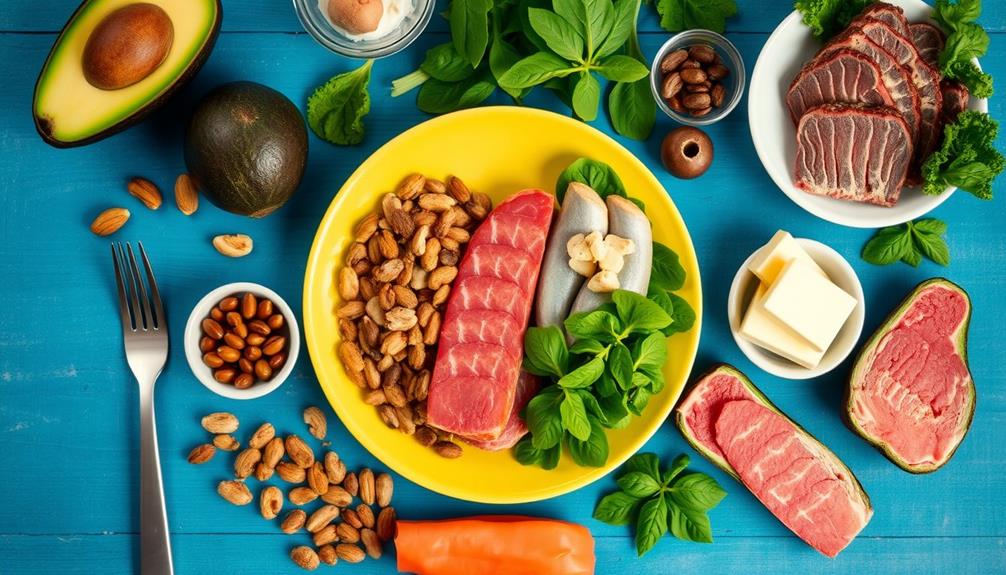
Often overlooked, essential nutritional considerations play a crucial role in the success of the keto diet. To thrive on this low-carb, high-fat regimen, you need to focus on incorporating nutrient-dense foods.
Include plenty of leafy greens, avocados, and nuts to guarantee you're getting enough vitamins and minerals, particularly magnesium, potassium, and B vitamins. Since the diet restricts fruits and whole grains, consider supplements to fill any nutrient gaps.
Prioritize wholesome fats, like olive oil and fatty fish, to optimize your cholesterol levels and support overall health. Remember, balancing fat quality is just as important as quantity.
This structured approach will help you navigate the diet effectively while minimizing potential deficiencies and maximizing health benefits.
Effective Monitoring Practices

To reap the full benefits of the keto diet and guarantee you're maintaining a healthy balance, effective monitoring practices are key. Keeping a close eye on your health metrics can help you navigate any risks associated with cholesterol changes.
Here are some effective monitoring practices to contemplate:
- Regular cholesterol testing: Track your LDL, HDL, and triglyceride levels.
- Keep a food diary: Record your daily intake to assess fat quality and quantity.
- Monitor symptoms: Be alert for any unusual health changes or side effects.
- Schedule routine check-ups: Consult with your healthcare provider regularly.
- Use apps or tools: Consider health apps to track your progress and maintain accountability.
Tailoring the Keto Approach
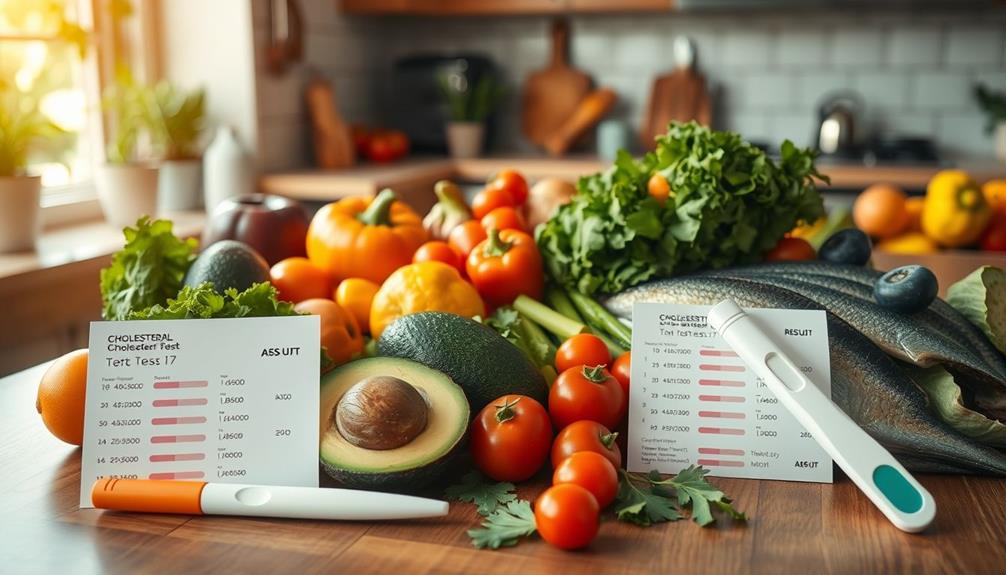
Customizing your keto diet can make a significant difference in achieving your health goals. Start by focusing on the quality of fats you consume. Opt for healthy sources like avocados, nuts, and olive oil, while limiting saturated fats from processed meats and dairy.
Incorporate low-carb vegetables to guarantee you're getting essential vitamins and minerals. Regularly monitor your cholesterol levels to see how your body responds and adjust your diet accordingly.
If you have pre-existing conditions, consult a healthcare professional for personalized advice. Remember, the keto approach isn't one-size-fits-all; tailoring it to your individual needs will help protect your heart health and support your overall well-being.
Stay flexible and make adjustments as needed to find what works best for you.
Frequently Asked Questions
Can I Eat Fruits on the Keto Diet?
You can eat some fruits on the keto diet, but focus on low-carb options like berries and avocados. Just watch your portion sizes to stay within your daily carb limit and maintain ketosis.
What Are the Best Sources of Healthy Fats?
For healthy fats, you should focus on avocados, nuts, seeds, olive oil, and fatty fish. These options provide essential nutrients while promoting heart health, so incorporate them into your meals for balanced nutrition.
How Quickly Can Cholesterol Levels Change on Keto?
You'll see your cholesterol levels transform faster than a cheetah on the hunt! Typically, changes can occur within weeks on the keto diet, but individual responses vary, so regular monitoring's essential for your health.
Is the Keto Diet Suitable for Everyone?
The keto diet isn't suitable for everyone. Individual health conditions, lifestyle, and dietary needs matter. It's essential to consult with a healthcare professional to determine if it aligns with your personal health goals and circumstances.
Can I Do Keto Vegetarian or Vegan?
Yes, you can follow a vegetarian or vegan keto diet. Focus on high-fat plant foods like avocados, nuts, seeds, and low-carb vegetables. Just make sure you're meeting your protein and nutrient needs while keeping carbs low.
Conclusion
To sum up, the keto diet can be a powerful tool for improving your health, but it's crucial to stay informed about its effects on cholesterol. Did you know that around 30% of people on the keto diet experience elevated LDL cholesterol? By focusing on high-quality fats and keeping track of your health, you can enjoy the benefits of keto while managing potential risks. Stay proactive, and make sure to tailor your approach to suit your unique needs!




